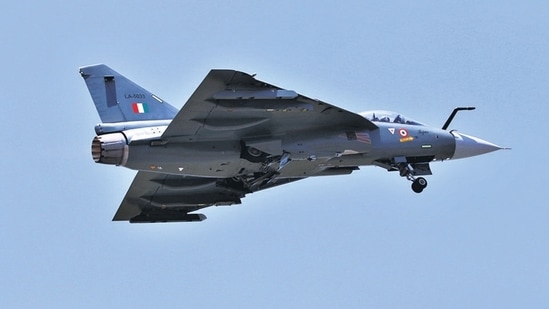
The Indian Air Force (IAF) has expressed its discontent over the delayed induction of the Tejas light combat aircraft (LCA Mk-1A), citing potential risks to its combat effectiveness. The IAF has urged Hindustan Aeronautics Limited (HAL), the manufacturer of the Tejas, to expedite the delivery of the 83 jets under the ₹48,000-crore contract.
Senior IAF officers have highlighted that the first Mk-1A aircraft, originally slated for delivery by March 31, 2024, is yet to be received. HAL now aims for the first delivery in August and assures the delivery of 16 fighters in the financial year 2024-25, with the entire order fulfilled by 2028-29.
However, concerns remain within the IAF regarding the feasibility of these deadlines, primarily due to the delayed supply of F404 engines from GE Aerospace, which is reportedly 10 months behind schedule. The engine delay, coupled with observations from the Mk-1A's maiden flight in March, has raised doubts about HAL's ability to deliver 16 aircraft this year.
The delay in the Mk-1A program has broader implications for the IAF. The Mk-1A is intended to replace the aging MiG-21 fighter fleet, and delays in its induction could lead to a significant capability drawdown. The IAF lacks a contingency plan for MiG-21 replacement, making the timely delivery of the Mk-1A crucial.
Despite these concerns, the IAF leadership has maintained its support for the LCA program and plans to order more Mk-1 aircraft. IAF chief Air Chief Marshal VR Chaudhari has described the Tejas as the flag-bearer of the air force's indigenization efforts.
HAL, acknowledging the delays, attributes them to the comprehensive certification process required for the new systems in the Mk-1A, which is essentially a new aircraft compared to the earlier Mk-1. The company has ramped up its production capacity, establishing a new production line in Nashik, to meet the IAF's requirements.
HAL officials have also addressed the engine delay issue, stating that they are working towards a resolution and have plans in place to mitigate the impact on the project timeline.
They are hopeful of receiving some F404 engines to deliver the 16 aircraft this year, and if further delays occur, they will continue building the planes and fly them with reserve engines. They remain confident in adhering to the overall delivery schedule by 2028-29.
GE Aerospace has not responded to queries regarding the reasons for the engine delay, but supply chain challenges are believed to be a contributing factor.
Despite the uncertainties surrounding the Mk-1A delivery schedule, the Ministry of Defense has issued a tender for an additional 97 LCA Mk-1As, indicating the IAF's continued commitment to the program. The LCA is poised to become a cornerstone of the IAF's combat power in the coming decade, with an estimated 350 LCAs of various variants expected to be in operation.
This development comes as the IAF relocates its last MiG-21 fighters, further signaling the impending phase-out of this iconic aircraft and the transition towards a new era of indigenous fighter jets.
